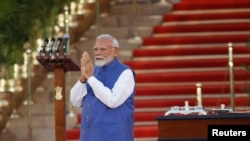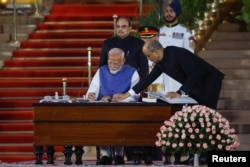Indian Prime Minister Narendra Modi was sworn in for a rare third term on Sunday at a glittering ceremony at the presidential palace in New Delhi. But he returns to office with a diminished mandate as head of a coalition government.
All eyes are now on how Modi, an assertive leader, will navigate his new term after ruling India with an absolute majority for a decade. With his Bharatiya Janata Party, or BJP, failing to cross the halfway mark in parliament, he is now dependent on regional allies.
“A majority is essential to run the country, that's the essence of democracy. But to run a country, consensus is also essential," Modi said at a meeting with his alliance partners on Friday.
Analysts say achieving that consensus with a new governance style will be a test for the Indian leader. While India is no stranger to coalition governments which ruled the country for a quarter century until 2014, the pulls and pressures of managing partners outside his party is uncharted territory for Modi.
“His style of functioning has been to take quick decisions, go into an issue, give a timeline for it to be implemented; it’s not into consulting scores of people, taking them along in that decision-making approach,” political analyst Neerja Chowdhury pointed out. “So that will require a new approach.”
At rallies and in interviews in the run-up to the recent election, Modi said he had prepared a 100-day plan to pursue big targets. But questions are being raised about whether he will find it harder to achieve his goals.
Analysts say he will be able to bring his allies along in pursuing reforms to spur manufacturing and attracting foreign investment needed to grow India’s economy. Modi has ambitions to turn India into a manufacturing powerhouse and a developed country by 2047. The country’s push to build closer ties with neighboring countries and the United States while retaining relations with Russia also has broad consensus.
“Big decisions on the economic front, opening up certain sectors to FDI, [foreign direct investment], he may not confront much of a resistance there,” according to Chowdhury. “Whether it is on the foreign policy he may take the allies along, and he may well take the opposition along also.”
But his party’s Hindu nationalist agenda could take a back seat. While he has a diverse set of coalition partners, two of the most crucial allies, the Telugu Desam Party of Andhra Pradesh state and Janata Dal (United) of Bihar belong to secular parties and do not share the BJP’s Hindu first agenda.
Analysts also point out that the inauguration of a grand temple in Ayodhya for Hindu god Rama in January – a centerpiece of his party’s Hindu agenda, failed to yield dividends. His party was defeated in the seat that is home to the temple and lost nearly half the seats in Uttar Pradesh state, where the temple is located. The politically crucial state, which sends most lawmakers to parliament, has been a BJP stronghold.
“The verdict of 2024 is in fact a kind of rejection of extreme Hindu nationalistic policies,” said political analyst Nilanjan Mukhopadhyay. “People did not actually vote for the BJP because they had got the temple constructed.”
Modi is also likely to focus more on pressing issues. Unemployment and inflation were the two biggest reasons nationally for people to go against Modi's alliance, according to a post-poll survey by the CSDS-Lokniti polling agency.
While the economy has expanded on his watch, it has failed to generate enough jobs for its huge population and the opposition has flagged widening wealth inequality in a country where millions are still poor. It had also raised concerns of democratic backsliding under Modi.
Analysts said besides his allies, the Indian leader will need to build a broader consensus with a reenergized opposition alliance that won a total of 232 seats out of 543, doubling its strength from the last election. Although many of its two dozen partners have ideological differences and compete for the same political space, the perceived threat from the BJP has kept them united.
“This verdict has pumped oxygen in the democratic system,” says Chowdhury.
Other analysts agree. “We have seen in the past 10 years, key decision-making involved power being cantered in the prime minister’s office. This will have to change,” said political analyst Sandeep Shastri.
It remains to be seen how the Indian leader, whom critics have called authoritarian and dictatorial, adapts to a new political reality.
“Mr. Modi will have to reinvent himself if he wants this government to continue and last its full term without any major political upheavals,” according to Mukhopadhyay, who has authored a biography on the prime minister. “Whether his instinct will allow him to make way for others' opinions, that remains to be seen.”
Modi is only the second Indian prime minister after Jawaharlal Nehru to retain power for a straight third tenure.
Among the thousands of guests who witnessed the Indian leader take office were leaders of seven neighboring countries, including Bangladesh, Nepal and Sri Lanka as well as Bollywood stars and industrialists.
In an outreach to the Maldives, with which ties have deteriorated, its president, Mohammed Muizzu, was also present for the swearing-in ceremony. His presence underscored India’s priority in forging strong ties in its neighborhood, where China’s influence is growing.

